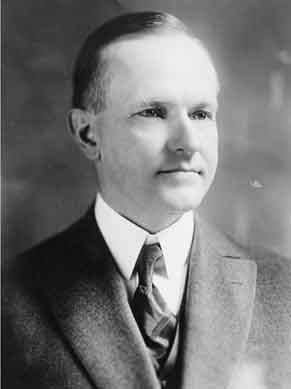Calvin Coolidge

Coolidge is probably best known for his statement that the "business of America is business." This reflected his position that government should interfere as little as possible with businesses and individuals. Elected 1924
The Early Years
Calvin Coolidge was born at the family home adjoining the Coolidge General Store in Plymouth, Vermont. From the age of 5 to 13, Coolidge attended the local elementary school. In 1886, he enrolled in the Black River Academy, graduating in 1890. From 1891 to 1895, Coolidge attended Amherst College. Coolidge graduated from Amherst in 1895, after which he studied law and was admitted to the bar in 1897.
After Coolidge's admission to the bar, he set up a law practice in Northampton, Massachusetts. There, he served in various local positions, including as a City Council member and City Solicitor. From 1907 to 1908, Coolidge served as of the Massachusetts state legislature. There he established a progressive record.
From 1910-1911, he served as the Mayor of Northhampton. From 1912 to 1915, he was a Massachusetts State Senator, the last year of which he was President of the Senate.
From 1916 to 1918, Coolidge served as an activist Lieutenant Governor of Massachusetts. From 1919 to 1920, he served as Governor of the State. The most notable moment of his administration was his strong opposition to the police strike in Boston in 1919. He rejected an appeal to support the re-hiring of striking teachers. He stated, "There is no right to strike against the public safety by anyone, anywhere, anytime."
Coolidge was a favorite son candidate for the Presidency at the Republican convention that nominated Warren Harding. The expected candidate for the Vice Presidency was Senator Irving Lenroot of Wisconsin. Then, Coolidge's name was entered almost by chance, and he won on the first ballot. Coolidge was not an activist as Vice President. He attended cabinet meetings but hardly ever participated in them. He hardly ever presided over the Senate.
Accomplishments in Office
Coolidge's nickname was "Silent Cal." He was known for his silence. He believed that the government should have as small a role as possible in the country and that the country's well-being was best preserved by allowing businesses to create wealth. His most famous remark was in a speech that he made in 1925, in which he stated, "The business of America is business."
Coolidge presided over a period when taxes and government spending were lowered. The President resisted appeals from Veterans for bonus payments. He vetoed the Soldiers' Bonus Act and the McNary-Haugen Farm Relief Bill. He continued to oppose American entry into the League of Nations, although he supported the United States' joining the World Court.
The First Family
Father: John Calvin
Mother: Victoria Josephine Moor
Wife: Grace Anna Goodhue
Sons: John, Calvin Jr.
Major Events
Fordney-McCumber Tariff
Teapot Dome Scandal
Immigration Receives Further Cut
Television Invented
Lindbergh Crosses Atlantic
Kellogg-Briand Pact
The Cabinet
Secretaries of State: Charles Evan Hughes Frank Kellogg
Secretary of Treasury: Andrew Mellon
Secretaries of War: John Weeks Dwight Davis
Attorney General: Harry Daugherty, Harlan Fiske Stone, John Sargent
Secretaries of the Navy: Edwin Denby, Curtis Wilbur
Postmaster General: Harry S. New
Secretaries of the Interior: Hubert Work, Roy West
Secretaries of Agriculture: Henry Wallace, Howard Gore, William Jardine Secretaries of Commerce: Herbert Hoover, William Whiting
Secretary of Labor: James Davis
Military
None
Did You Know?
First President sworn in by his father.
First President whose inauguration was broadcast over the radio.
Born on the 4th of July.
